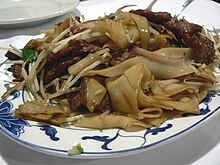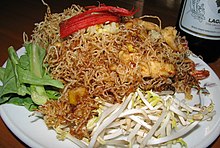Fried noodles
Appearance
(Redirected from Fried noodle)

Fried noodles are common throughout East Asia, Southeast Asia and South Asia. Many varieties, cooking styles, and ingredients exist.
Fried noodle dishes
[edit]



- Beef chow fun – Cantonese dish of stir-fried beef, flat rice noodles, bean sprouts, and green onions
- Char kway teow[citation needed] – Chinese–inspired dish commonly served in Malaysia and Singapore, comprising stir-fried, flat rice noodles with prawns, eggs, bean sprouts, fish cake, mussels, green leafy vegetables and Chinese sausages.
- Chow chow – Nepali–style stir-fried noodles, often cooked with onion, vegetables and buff (water buffalo meat) and also widely eaten in India[1][2]
- Chow mein – dish featured in Nepalese cuisine, American Chinese cuisine and Canadian Chinese cuisine; also a generic term for stir-fried wheat noodles in Chinese
- Drunken noodles (phat khi mao) – Thai dish of stir-fried wide rice noodles
- Hokkien mee – Chinese–inspired Malaysian and Singaporean dish, of stir-fried noodles with many variations in ingredients
- Japchae – Korean dish made with cellophane noodles[3]
- Kwetiau goreng – Chinese Indonesian stir-fried flat rice noodles (kwetiau or shahe fen) with garlic, shallots, beef, chicken or prawn, chili, vegetables and sweet soy sauce
- Lo mein – American Chinese–style stir-fried wheat noodles
- Mee goreng - fried noodles common in the Malay-speaking communities of Malaysia, Singapore and Sri Lanka
- Mee siam – Malaysian and Singaporean dish of rice vermicelli[4] in spicy, sweet and sour light gravy. Dry variations are also common.
- Mie goreng – spicy stir-fried yellow wheat noodles common in Indonesia
- Mie goreng Aceh – hot and spicy stir-fried thick yellow wheat noodles from Aceh province, Indonesia
- Pad thai – Thai–style stir-fried rice noodles with egg, fish sauce, and a combination of bean sprouts, shrimp, chicken, or tofu
- Pancit bihon – Filipino stir-fried rice vermicelli
- Phat si-io – Thai dish of stir-fried wide rice noodles
- Rat na – Thai dish of stir-fried wide rice noodles
- Shanghai fried noodles
- Singapore chow fun/Singapore-style rice vermicelli – not actually from Singapore; Cantonese dish of thin rice noodles stir-fried with curry powder, bean sprouts, barbecued pork, and vegetables
- Singapore chow mein – same as above, but with wheat noodles
- Yaki udon – Japanese stir-fried thick wheat udon noodles
- Yakisoba – Japanese-style fried wheat or buckwheat noodles,[5] flavoured with sosu (Japanese Worcestershire sauce) and served with pork, cabbage, and beni shōga; often served at festival stalls or as a filling for sandwiches
- Hong Kong fried noodles– Hong Kong-style dish consisting of flour noodles pan-fried until crispy, and served together with vegetables, chicken or seafood

- Fried crunchy wonton noodles – deep-fried strips of wonton wrappers,[6] served as an appetizer with duck sauce and hot mustard at American Chinese restaurants
- I fu mie, Chinese Indonesian dried fried yi mein noodle served in sauce with vegetables, chicken or prawns.
- Mie kering, Chinese-influenced deep-fried crispy noodle from Makassar, Indonesia. Also known as kurum kurum in part of Pakistan.
- Mi krop – Thai dish consisting of crispy deep-fried rice noodles.
See also
[edit]References
[edit]- ^ Ahuja, Aashna (2015-11-27). "Indian Chinese Cuisine: India's Love Affair with Chinese Food". NDTV. Retrieved 2020-03-02.
- ^ Bindloss, Joseph (2010). Nepal: Country Guide Series, Lonely Planet guidebooks. Lonely Planet. p. 65. ISBN 9781742203614.
- ^ Yarvin, B. (2014). A World of Noodles. Countryman Press. pp. 131–132. ISBN 978-1-58157-686-3.
- ^ Saw, B. (2011). Betty Saw's Best Noodle Recipes. Marshall Cavendish International (Asia) Private Limited. p. 70. ISBN 978-981-4484-98-5.
- ^ Shurtleff, W.; Aoyagi, A. (2014). History of Meat Alternatives (965 CE to 2014): Extensively Annotated Bibliography and Sourcebook. Soyinfo Center. p. 353. ISBN 978-1-928914-71-6.
- ^ Tourondel, L.; Scicolone, M. (2015). Bistro Laurent Tourondel: New American Bistro Cooking. Houghton Mifflin Harcourt. p. 49. ISBN 978-0-544-79251-7.
